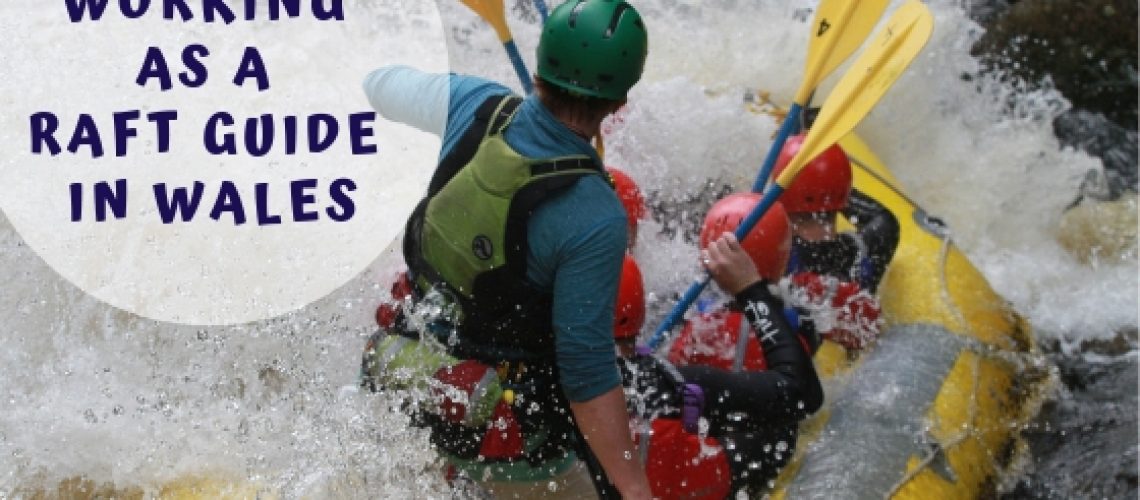I spent a couple summers in Wales working as a raft guide. It was a glorious time of life.
In today’s society there is so much stress. Rushing to work and then rushing home again. Worrying about what the next day will bring and meeting deadlines. Questions always ringing aound our heads “Do I have enough money to pay rent?” “Do I have enough money to go out and be sociable?”. There was always something to stress about. We’ve fallen back into this life and it sucks, it’s not good for our health. We’ve realised this and are working our way back towards living a better life. I always think back to the summers when I was working as a raft guide in Wales, it didn’t follow the trend of today’s city society. Life was so much better…
An average day was spent getting to work for 9:30am. I’d help get the rafts ready and go white water rafting until about 4pm. Then we’d pack up the rafts, have a beer and head out for the evening. The awesome thing about Wales is that there is so much to do, especially with a good group of mates! Every evening would be different. From going whitewater kayaking, beach parties, searching out waterfalls, mountain biking, making a fire and having a BBQ, hill walking, going to the local pub or just sitting at home enjoying a bit of Netflix and chill. Wales was a heaven that I got to experience for 3 blissful months each year.

How I Became a Raft Guide in Wales?
I guess I was pretty lucky. I’ve always been able to find a job by simply knowing someone or being in the right place at the right time. Becoming a raft guide in Wales was no different. When I was working in Nepal as a whitewater river guide I met a guy who worked at the National Whitewater Center in Wales and he told me I should apply and he’d put a good word in for me. The rafting center said that they were happy to have me as long as I passed my raft guide assessment course. Truth be told, the center uses guides on a freelance basis. As long as you have your qualifications then they will be happy to have you. This is pretty much the same with most rafting centers in the UK.
So, to qualify you need to:
- Attend a 3 day training course.
- Have a minimum of 20 hours of raft guiding logged while sitting on with another guide.
- Have attended a whitewater safety course in the last 3 years.
- Successfully complete the assessment course.
It sounds pretty daunting and that it will take a long time but it really doesn’t. The rafting centre helped me a lot. They organise multiple training courses throughout the year that you can book onto. They will then let you sit on the raft for free get get your log book hours. A normal session will last 2 hours. That means that only 10 sessions later and you can have your log booked filled! The rafting centre also runs whitewater safety courses throughout the year. Fortunately, I already had a whitewater safety course earlier that year. I was able to take my raft guide assessment as soon as I got my 20 hours logged and passed on the first go! In all it took me about 3 weeks from attending my training to completing my assessment.

What about the a Raft Guide’s Pay?
When you work as a raft guide there really isn’t much to worry about at all. The key is to remember that you don’t have to earn a lot to live well. As I said before, a raft guide works as a freelancer. We get paid per session that we run. On average I was paid £30 per session. Per month I was probably earning between £1000 to £1500 depending on when the rafting centre was busy.
Working as a raft guide will often mean you need to live in a rural area. This means that rent is pretty cheap! Normally, I’d end up paying £200 – £300 a month including all bills in a house share. Then there is food to pay for, say £200 per month (home delivery is ideal!). I’d then have £500 – £1000 to spend on adventuring, saving, and generally having a good time with mates! This isn’t loads but it is enough to live off, buy some goodies and save for the next big adventure!
Health and Stress Working as a Raft Guide?
I found that working as a raft guide was good for my overall health too. The rafting centre would have me working 5 or 6 days a week, if not more! I became very active – constantly pushing and pulling on the paddle. Carrying the raft to the put in and pulling in punters that fell in the river. All this exercise helped me get super strong very quickly. As I didn’t have a car, I’d often cycle to work too! So, without even meaning to, I found myself exercising for hours each day. And that was just as work. Living in Wales and my love with adventure mean that I was always doing something fun and active in the evenings. From mountain biking, slack lining, hiking, or kayaking.
I found that there was also a general lack of stress when worked as a raft guide. I just didn’t have a lot to worry about. Work will always come, even if the weather is bad. There aren’t many bills to pay. And getting out to do cool things is cheap as chips!

Living in Wales
My friends had a simple motto – “Wales Never Fails”, and it didn’t! Rural Wales has such a good way of life. It’s slower, more relaxed and less stressed. I was living on the boarder of Snowdonia in a little town called Bala. It’s a pretty, little place with a high-street that’s about 100m long but still has 6 pubs/bars. The raft guide’s local is the Bull’s Head – a classic British pub with big oak beams, a roaring fire and drunk karaoke disco on Friday nights.
In my opinion Snowdonia is the Adventure capital of the UK. I could drive in any direction and within an hour or two I can go surfing, climbing, hiking, kayaking, mountain biking – pretty much everything I could want to do! Some days I’d get up in the morning before work to go Kayaking, spend the day working (rafting) and then go climbing in the evening.
The only real downside to living in Wales was the public transport. I didn’t have a car so I was either relying on my bike, friends to drive me or jumping on a bus. There aren’t many train services in north Wales due to the hilly/mountainous terrain, so it was all down to buses. But when you live with a community of people that also love the outdoors as much as I did, I always found a way to get outside and adventure! The lack of transport may be an put off to some people, but when you work as a raft guide, your friends become family and everyone helps in the search for adventure.
Do you fancy the life?
I’d highly recommend anyone thinking about working as a raft guide to give it a go. Its not easy by any means. There is a lot of skill to guiding a raft and the pay can be small, so it isn’t a life for everyone. But if you’re looking for a high quality of life and if you can learn the skills required you, will have some of the greatest times you will remember. Working as a raft guide was an amazing experience and if I hadn’t worked as a raft guide in Wales, I would never of got my job as a Sea Kayak Guide in Milford Sound! Told you, it’s all about who you know in the outdoors industry.
Let me know if you are wanting interested in becoming a raft guide! I’ll be happy to answer any questions, offer advice and point you in the right direction when it comes to looking for jobs.



4 thoughts on “Working as a raft guide in Wales”
Looking for raft guide position
Awesome! I don’t own a raft guide company but hope you find one in the future!
It is a wonderful article stating about the guide for working raft wales.I am really happy to come across this exceptionally well written content. I agree with all your points that you have stated here, love this blog.Thanks for sharing and look for more in future!!
Thanks so much!